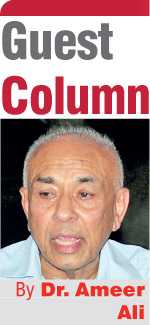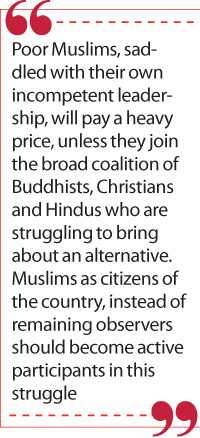Wednesday Feb 18, 2026
Wednesday Feb 18, 2026
Thursday, 4 March 2021 00:00 - - {{hitsCtrl.values.hits}}

It has been one of the saddest chapters in Sri Lanka’s political history since independence, that when governments were pushed to a corner, facing mounting problems and loss of confidence with people, they resorted to communalism to win back their losses. The current regime faced with intractable issues, practically in every sector of governance, and in its external relations, is also looking for a scapegoat – Pix by Shehan Gunasekara
 President Gotabaya Rajapaksa’s gazette notification to allow burial of COVID-dead Muslim bodies was a calculated concession to avoid any punishing outcome from UNHCR council meeting in Geneva. The Muslim community had a sigh of relief, after nearly 12 months of agony and trauma.
President Gotabaya Rajapaksa’s gazette notification to allow burial of COVID-dead Muslim bodies was a calculated concession to avoid any punishing outcome from UNHCR council meeting in Geneva. The Muslim community had a sigh of relief, after nearly 12 months of agony and trauma.
However, it was also a great disappointment to those supremacist demagogues and Islamophobic monks who were adamant that one country one law should prevail on the matter. That disappointment was immediately demonstrated when the soil scientist professor, who originally advanced the dubious argument that the pandemic would spread through contaminated underground water, resigned from the panel of experts. It was that argument which was grabbed by the anti-burial lobby that wanted to enjoy some sort of sadistic pleasure from inflicting pain on Muslims.
The rest of the experts, public health officials and administrators started working overtime to look for obstacles that could be erected to frustrate the implementation of the President’s decision, or, at least to make it more hazardous for implementing.
This is now clearly evident in the decision to allow burials to take place only in Iranaitheevu in the north, in the Gulf of Mannar. This strange decision proves one of two things. Either it repudiates the soil scientist’s argument, because the 300 or so people who inhabit this small island take their drinking water from the ground, and therefore the team of obstructionists seem to believe that those inhabitants would not be harmed by the burials.
If that is so, why not allow those bodies be buried in cemeteries closer to the dead person’s residence? What is wrong with Kuppiyawatte for example, as pointed out in the Parliament by one legislator and approved by geologists?
On the other hand, if the team still holds on to the water level argument, then it implies that the true intention is rather sinister and sadistic in trying to get rid of those poor souls from the island by way of pandemic infection. No wonder the Tamils and Christians are protesting against this move.
On another level, the choice of a spot in the Tamil north to bury COVID-dead Muslim may be to stir up Tamil-Muslim communal rift especially after the regime witnessed the two communities’ spontaneously coming together at the P2P march.
Whatever the reason may be, Muslim suffering continues unabated by this irrational decision. Just imagine the pain and cost of transporting a dead body from Pottuvil to Iranaitheevu for example. The Government apparently is prepared to bear the full cost of the expenses, although details are not clear yet.
Even then, how many family members and religious functionaries would be allowed to accompany the body and whether the entire cost of the two-way journey be met by the Government have not been detailed.
Why is this issue being protracted without a definite solution? There may be two reasons, one short term and the other medium or long term. 
In the short term the Rajapaksas, as mentioned at the beginning, want to show a conciliatory face to UNHCR council to avoid any negative outcome from Geneva. If that strategy succeeds, the cremation will be back in operation, and Muslims would be forced to live with it.
The medium term or long-term reason is much more dangerous. The Muslim issues including burial would be kept alive inordinately, because the regime wants a distraction to keep the majority community side-tracked from other burning issues, of which the economy is the most important.
The economy is in dire straits either in spite of or because of the so called “alternative way”, as adumbrated recently by the Governor of Central Bank. Cost of living is sky rocketing and household distresses are mounting.
The regime’s ad hoc measures to introduce ceiling prices for essential consumer items are not working. Nowhere could consumers buy any of those commodities at Government fixed prices. Unrests and demonstrations are becoming more and more frequent and may escalate nationwide if situation worsens. This is why the regime is looking for a distraction.
After the Easter massacre, Muslims have become an obvious target for scurrilous propaganda and physical violence. No sooner forced cremation showed signs of being relaxed, other issues such as the mosque at Dambulla, Muslim Marriage and Divorce Act, madrasa education and Muslim schools are picked up to keep the pressure on Muslims. A few larrikin monks are back at their game of whipping anti-Muslim emotions.
It has been one of the saddest chapters in Sri Lanka’s political history since independence, that when governments were pushed to a corner, facing mounting problems and loss of confidence with people, they resorted to communalism to win back their losses. The current regime faced with intractable issues, practically in every sector of governance, and in its external relations, is also looking for a scapegoat.
Poor Muslims, saddled with their own incompetent leadership, will pay a heavy price, unless they join the broad coalition of Buddhists, Christians and Hindus who are struggling to bring about an alternative. Muslims as citizens of the country, instead of remaining observers should become active participants in this struggle.
(The writer is attached to the School of Business & Governance, Murdoch University, Western Australia.)